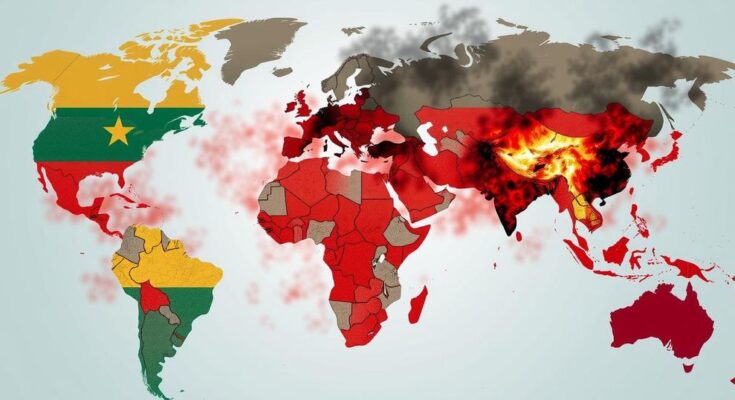Sudan’s conflict, entering its 20th month, exacerbates a humanitarian crisis with extensive civilian casualties. Myanmar’s military junta faces criticism for a flawed census and humanitarian violations amid ethnic conflicts. The DRC’s MONUSCO peacekeeping mission’s renewal responds to escalating violence and human rights abuses linked to resource exploitation.
The ongoing conflict in Sudan has entered its 20th month, leading to extensive civilian suffering and a dire humanitarian situation. The Sudanese Armed Forces (SAF) intensified operations against the Rapid Support Forces (RSF), resulting in airstrikes that killed civilians in Khartoum. The UN documented significant civilian casualties in Darfur, with over 782 reported deaths since May 2024, prompting the U.S. to label actions by the RSF as genocide. The crisis has left over 24.6 million in acute food insecurity, with famine declared in multiple areas, and calls for international intervention continue.
In Myanmar, the military continues to clash with ethnic resistance organizations amid a controversial census aimed at pre-election preparations. Significant portions of the country remain beyond military control, limiting the census and perpetuating grievances, particularly against the Rohingya. Reports indicate severe human rights violations, and aid access restrictions exacerbate the humanitarian crisis. Some ethnic armed groups show a willingness to engage in political dialogue, but the international community is urged to maintain scrutiny on the junta.
In the Democratic Republic of the Congo (DRC), the UN Security Council renewed the MONUSCO peacekeeping mandate due to increased violence from armed groups, particularly in resource-rich eastern regions. Reports of human rights violations have surged, necessitating the continued presence of MONUSCO to protect civilians amidst escalating conflicts over natural resources. The DRC’s complaint against Apple over conflict minerals illustrates the intersection of corporate responsibility and human rights in the region, underscoring the urgent need for systemic reform and adherence to ceasefires to promote lasting peace.
The article covers three critical humanitarian crises occurring in Sudan, Myanmar (Burma), and the Democratic Republic of the Congo (DRC). Each section highlights the intricate interplay of armed conflict, humanitarian devastation, and international responses. In Sudan, the conflict has produced a catastrophic humanitarian emergency, while Myanmar grapples with civil unrest post-military coup and ongoing ethnic violence. For the DRC, the renewal of UN peacekeeping operations comes amid rising violence tied to mineral resource exploitation, emphasizing the complexity of conflict-driven humanitarian needs.
This report underscores the urgent humanitarian crises in Sudan, Myanmar, and the DRC, where violence, starvation, and human rights abuses continue to escalate. The international community must prioritize effective responses, advocating for ceasefires, promoting humanitarian aid access, and scrutinizing corporate involvement in conflict. Long-term solutions will require cooperation among local and global actors to address the systemic drivers of these crises and protect vulnerable populations. The future of these regions hinges on addressing both immediate needs and the underlying issues that fuel ongoing violence.
Original Source: www.globalr2p.org




